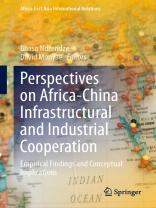This edited volume discusses infrastructural cooperation and industrial cooperation between China and several countries in Africa. In contributions by academics and practitioners alike, the book distils the conceptual implications of empirical and ethnographic findings and explores probable future developments in the Africa-China relationship. The chapters deal with numerous countries across the African continent, covering nearly all regions, showcasing the dynamics of China’s relations with different countries while highlighting African agency over major infrastructure projects and industrial activity. Providing an in-depth look at the evolving economic cooperation across these two regions, this volume will appeal to researchers and students of African politics, international relations, area studies, and comparative politics. The book will be of relevance to policymakers in governments, international organizations, and non-governmental organizations involved in policy formulation particularly regarding the Africa-China/China-Africa relationship.
Daftar Isi
INTRODUCTION: PUTTING AFRICA FIRST IN AFRICA-CHINA COOPERATION – A CONCEPTUAL AND POLICY CONUNDRUM.- PART I: INFRASTRUCTURAL COOPERATION.- The Emergence of Railway Diplomacy in Africa: From South Africa to China?.- China-Ethiopia Infrastructural Cooperation .- Chinese Investment in West African Infrastructural Development: Selected Case Studies.- African Infrastructure: A Focus on ICT.- Egypt-China Relations after Egypt’s 2011 Revolution: A Focus on Physical Infrastructure.- PART II: INDUSTRIAL COOPERATION.- The Role of Agriculture in African Industrialisation .- ‘Made in Uganda by China’: Chinese Industrial Parks in Uganda.- Sino-Kenyan Industrial Cooperation.- PART III: FUTURE DIRECTIONS.- The Regional Infrastructural Imperatives of the ACFTA for Development in Southern Africa.- China, BRI and the 4IR in Africa: A Focus on Rwanda .- China’s Africa debt trap question: Ethiopia and Kenya Infrastructure Case Studies.- The Belt and Road Initiative and the Build Back Better World: Implications on Africa’s Infrastructure Development.
Tentang Penulis
Bhaso Ndzendze is Head of Department and Associate Professor in the Department of Politics and International Relations at the University of Johannesburg and former Research Director of its Centre for Africa-China Studies. His publications have appeared in numerous journals and in the popular press, in South Africa and internationally. His most recent books include the co-edited volume The BRICS Order: Assertive or Complementing the West? (Palgrave Macmillan) and Artificial Intelligence and Emerging Technologies in International Relations.
David Monyae is Co-Director of the Centre for Africa-China Studies at University of Johannesburg, South Africa He is also an Associate Professor in the Department of Politics and International Relations in the same university. He previously served as Section Manager for International Relations Policy Analysis at the South African Parliament. Prior to that he served as Policy Analyst at the Development Bank Southern Africa (DBSA). For nine years prior to that he lectured on South African foreign policy and African international relations at the University of the Witwatersrand. He has published widely and is a prolific political analyst, featuring in the national and international popular media, books and academic journals. His most recent book is the co-edited volume The BRICS Order: Assertive or Complementing the West?












